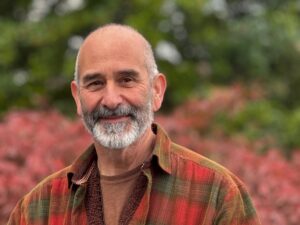 Brian Joshin Byrnes, Sensei
Brian Joshin Byrnes, Sensei
Personal Journey and Vision
It wasn’t until later in life, in my mid-forties, that I encountered a style of Zen that piqued my intellectual curiosity, touched my heart, and called me into a sense of vocation. Raised Roman Catholic and having studied with the Dominicans, my early spiritual formation was influenced by vows centered on communal prayer, ongoing study, and a path of service. However, by my late twenties, during the AIDS epidemic and my own process of coming out as a gay man, I left the Church in an angry and harsh reaction, entering a period of wandering in a dry spiritual desert.
As I confronted classic symptoms of burnout in my professional work during the AIDS epidemic, my heart began to soften. In a moment of difficulty, someone suggested that by rejecting religion, I had stopped tending to the wellbeing of my inner life. Without caring for the inside, dealing with outside challenges of family, community, work and world was overwhelming. I was falling short of being the “non-anxious presence” I aspired to be in my relationships. The choice became clear: I either had to pivot, take a backward step and start doing some important inner work, or continue to let my unsettledness get in the way of happiness.
I turned to Eastern traditions for guidance and was ultimately inspired by the Zen Peacemakers and the work of Bernie Glassman, Roshi. Learning about his work in Yonkers, NY, where he adapted Zen and Buddhism to a social-enterprise network of businesses that included bakery that hired so-called un-hirable people to make brownies for Ben and Jerry’s ice cream, brought clarity, focus and commitment to my Zen path.
Initially, like many, I did a lot of reading about Zen and Buddhism. After a period of study, I became a student of Roshi Joan Halifax, one of Bernie’s students. From 2009 to 2017, I lived, studied, and trained at Upaya Zen Center, where I received dharma transmission from Roshi Joan. As a teacher and priest in the White Plum lineage of Taizan Maezumi Roshi, I continue to be influenced by Bernie Glassman’s example in shaping the Bread Loaf Mountain Zen Community.
I find the Zen path to be dynamic and ever-evolving. I appreciate Maezumi’s invitation to create a Zen that reflects the culture of our own time and place. I embrace the ancient ways, practices, and teachings transmitted from China and Japan, but I also like to integrate contemporary innovations that express the heart of these ancient teachings in new ways, and perhaps catch us by surprise.
Community Zen practice, which I use to describe socially-engaged practice at the local level, is rooted in Buddhism and Zen but enriched by contemporary culture and encounters with other traditions. As Keizan wrote seven hundred years ago, “Don’t just long for the past. Avail yourself of the present day to practice Zen.” While Dogen reformed Zen for monastics, Keizan envisioned a more widely applicable Zen that could support people regardless of their place in society.
I have spent considerable time working in the economic cracks of society, leading social service agencies and community philanthropic organizations, and addressing systemic suffering related to marginalization. Homelessness, poverty, and untreated mental health and substance use disorders have been areas where I apply my understanding of the Dharma. These issues have touched and affected me and my family, and they have been the grist of practice life and spiritual growth. Street retreat practice and Gather are settings where I practice the ancient wisdom of Zen and manifest a life of vow based on the precepts.
As a teacher and priest, I see my role as offering ways for others to practice with the truth of their lives. Offering the precepts, maintaining a temple life, and teaching in traditional settings gives me a foundation to practice a more informal, experimental and accessible style of Zen in community settings. Each moment of practice, whether in the traditional zendo or in a community service, connects past and future, inner and outer, full of potential and possibility. Bread Loaf Mountain Zen Community sits at an interesting intersection of old Zen and new, as well as contemplative practice and service to others.
To learn more about Joshin’s journey and teachings, you’re invited to listen to his interview with meditation teacher and author Sharon Salzberg. In this conversation, Joshin shares his experiences and inspirations, as well as his view of the ways in which Zen practice can shape our engagement with the world at the intersection of spirituality, social action, contemplative practice, and compassion.
The recordings of Joshin’s dharma talks from July 14, 2024 on are now available. Click here to enter the recordings

